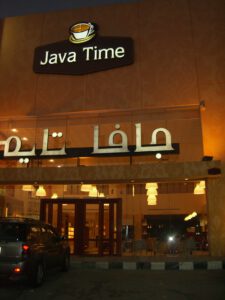Saudi Arabia: Rapid “Westernization” of Taste Profiles Offers U.S. Companies High Potential

AMI recently visited the Kingdom of Saudi Arabia to assess current and prospective distributors on behalf of one of its clients. As expected the visit served to achieve the objective of selecting the most highly qualified distributor which offered the highest potential for this client’s growth. Additionally, however, this visit served to convince me that Saudi Arabia – and the entire Persian Gulf region – offers huge opportunities for U.S. food and beverage manufacturers to develop their brands in high-growth markets.
The Saudi business people (I met only men) are professional, thoughtful and strategic in their approach. It is important for them to develop relationships with the people they will be working with. I found a high degree of loyalty and service by the Saudi companies to the foreign brands that they were representing. To a foreigner, their graciousness and hospitality are outstanding. However, among themselves there is frequent switching of loyalties and various business practices employed to gain advantage over competitors. In order to understand what lies beneath the surface in Saudi Arabia, a foreign business person must ask questions to multiple parties before formulating an opinion.
Saudi Arabia’s economy will grow by 4% this year as oil production increases, up from 0.6% in 2009. Real GDP is forecast to grow 4.5% in 2011 and 4.7% in 2012. Inflation is stable at 5%. The Kingdom is now undergoing a $400 billion stimulus program to boost its economy and create jobs for its 25 million people. This fiscal stimulus is also expected to increase imports, much of it in the food and beverage sector.
The Kingdom is awash in foreign fast food chains and casual dining brands such as KFC, Pizza Hut, McDonald’s, Applebee’s, and others. Leading international and local coffee shops dominate the social scene due to the lack of bars and other places for families and lovers to meet. While most of the major players are present in the market – Starbucks, Costa, Coffee Bean & Tea Leaf, Dunkin’ Donuts – there are several local coffee shop chains that have equally high quality standards and a good perception among local Saudis. Many of the local coffee shops differentiate themselves by having “private rooms” for families and friends which are cordoned off by curtains or locked doors.
In addition to Saudi Arabia, other Gulf Cooperation Council (GCC) countries (Kuwait, Bahrain, Qatar, United Arab Emirates and Oman) are experiencing high GDP growth, rising income levels, and a young population eager and willing to try new food and beverages. These countries are also diversifying from oil and encouraging their citizens to consume imported items. The GCC countries have no barriers to cross-country investment and services trade. Soon the GCC will be a free-trade zone, but this has not yet been fully implemented. Only Bahrain has a separate free trade agreement with the U.S.
If you are seeking accelerated growth of exports, then I encourage you to consider markets in the Middle East. The people are friendly, cooperative, hospitable, and eager to engage with U.S. companies. In fact, most Saudi businessmen I spoke with prefer importing from the U.S. rather than Europe because the Saudi riyal is pegged to the U.S. dollar, while the Euro fluctuates, increasing risks for importers. U.S. companies would do well to exploit this competitive advantage while they still enjoy it.

